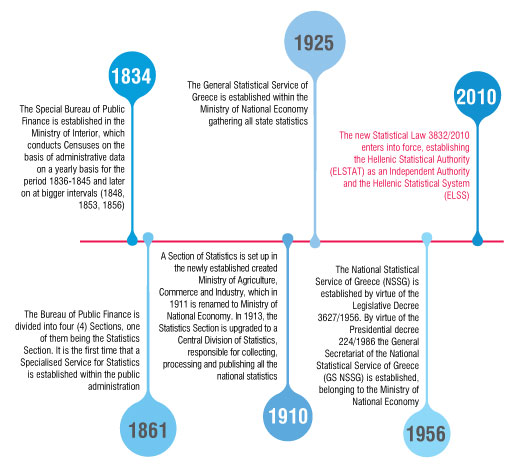The evolution of the statistical service of Greece

1828-1860
1828: conduct of the first Population Census.
1834: the Special Bureau of Public Finance is established in the Ministry of Interior, which conducts Censuses on a yearly basis for the period 1836-1845 and later on at bigger intervals (1848, 1853, 1856).
1861-1909
1861: the Bureau of Public Finance is divided into four (4) Sections, one of them being the Statistics Section. It is the first time that a Specialised Service for Statistics is established within the public administration.
1861: conduct of the Population Census and the Agricultural Census
1910-1924
The modernisation of public administration, including the Specialised Service for Statistics, begins in 1910. A Section of Statistics is set up in the newly established Ministry of Agriculture, Commerce and Industry, which in 1911 is renamed to Ministry of National Economy. In 1913, the Statistics Section is upgraded to a Central Division of Statistics, responsible for collecting, processing and publishing all the national statistics concerning population, vital statistics and migration, production in agriculture, industry, manufacture and related sectors, statistics on transport, internal/external trade, communication, justice, prices, etc. A Statistics Council is established consisting of university professors and representatives of the Chambers of Commerce and Industry. The main statistical works of this period are: the Agricultural Census and the Surveys on Prices of basic consumer goods (1911), the Population Censuses on the new territories ceded to Greece (1913), the Industrial Census and the Population Census (1920) and the Census of Refugees from Asia Minor (1923).
1925-1955
1925: the General Statistical Service of Greece is established within the Ministry of National Economy gathering all state statistics.
1929: the Monthly Statistical Bulletin is published for the first time. 1930: publication of the Statistical Yearbook of Greece. Main statistical activities during this period are: the Population Census, the Survey on Libraries and Press and the Household Budget Survey of Industrial Workers (1929), the Census of Industrial Enterprises (1930), the Population and the Agricultural Census (1940), the Agricultural Census (1950) and the Population Census (1951).
1956-2009
By virtue of the Presidential decree 224/1986, the General Secretariat of the National Statistical Service of Greece (GS NSSG) is established, belonging to the Ministry of National Economy. The issues concerning the access of the GS NSSG to administrative sources and files and statistical confidentiality are governed by the Law 2392/1996.
2010 - to date
The new statistical law 3832/2010 enters into force. This law, as amended by the laws 3842/2010, 3899/2010, 3943/2011, 3965/2011, 4047/2012, 4072/2012, 4182/2013, 4244/2014, 4254/2014, 4258/2014, 4334/2015, 4484/2017, 4512/2018 and by the Legislative Act dated 18/11/2012, provides for:
- the establishment of the Hellenic Statistical Authority (ELSTAT) as an independent Authority;
- the establishment of the Hellenic Statistical System (ELSS);
- the establishment of the Council of the Hellenic Statistical System (SYELSS) and the Good Practice Advisory Committee whose task is to prepare an annual report on the implementation of principles 1 to 6 (institutional framework) of the European Statistics Code of Practice;
- the principles governing the statistical activities of ELSTAT and the other ELSS agencies as regards the development, production and dissemination of statistics, according to the provisions of Regulation (EC) 223/2009 of the European Parliament and of the Council, as these are developed in the European Statistics Code of Practice, stipulated in Article 11 of the above Regulation;
- the assignment to ELSTAT of the coordination of the activities of the other ELSS agencies, as regards the development, production and dissemination of the Country’s official statistics, as well as the certification as “official” of the statistics produced by other ELSS agencies.

